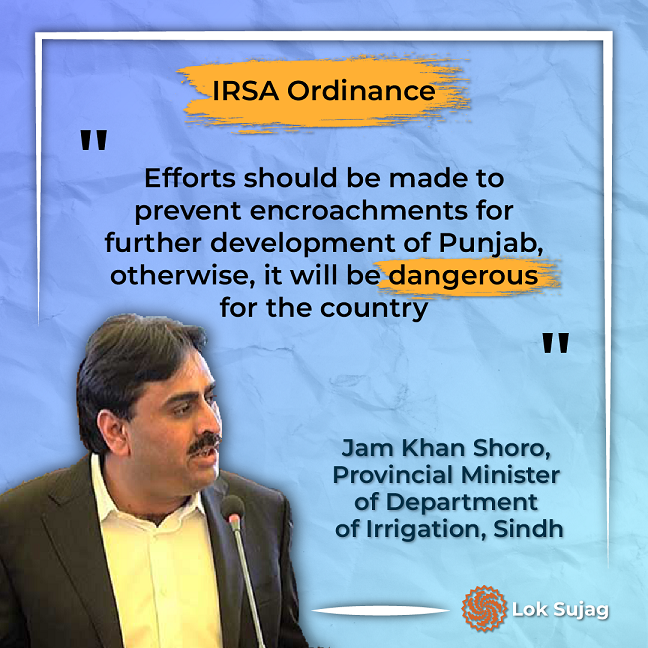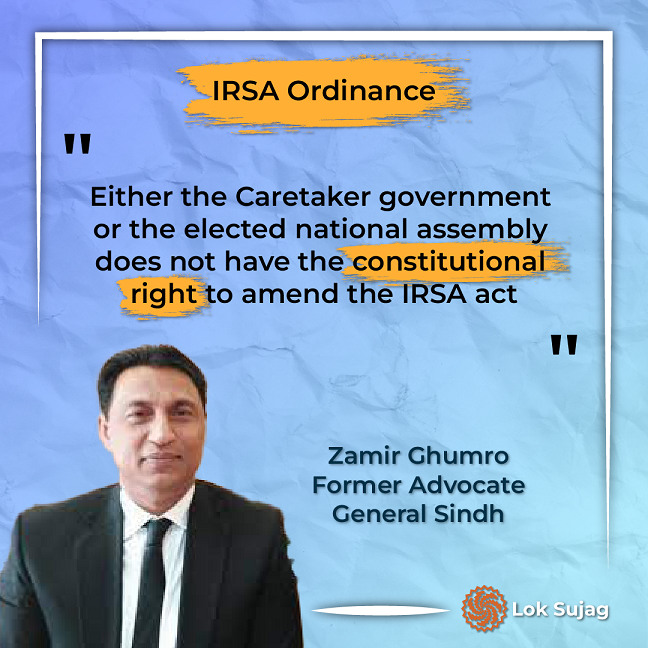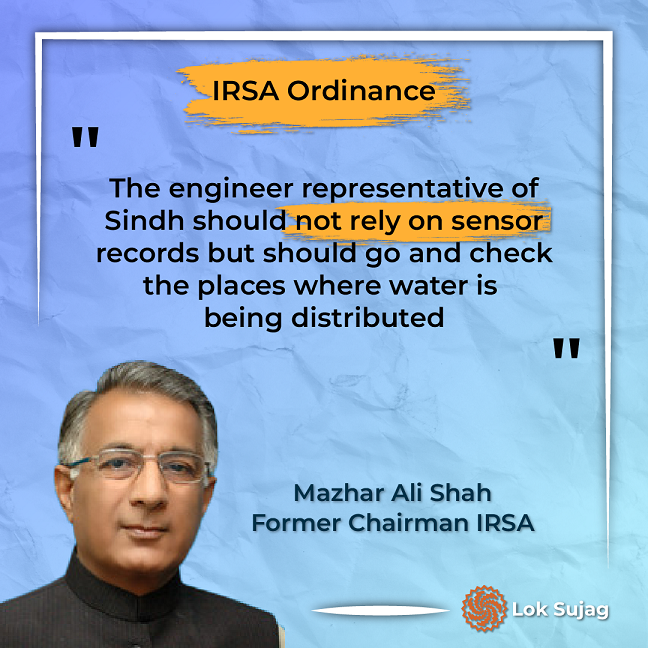Prime Minister Shehbaz Sharif appointed a new chairman of the Indus River System Authority on March 12. However, he withdrew his order within two days after a strong reaction from Sindh.
The Prime Minister made this appointment under the IRSA Ordinance 2024, enacted by the caretaker government. Delve into the details below to understand how the IRSA Ordinance 2024 completely overhauls the framework established by the IRSA Act 1992.
Introducing the 'new custodian' of Pakistan's rivers!
Lok Sujag reached out to pertinent experts in Sindh to engage in discussions on this matter.
"Prime Minister Shehbaz Sharif has betrayed the trust of Sindh"
Provincial Minister of Sindh Irrigation Department Jam Khan Shoro
In conversation with Lok Sujag, Minister Jam Khan Shoro highlighted that the 1991 water agreement and the establishment of IRSA in 1992 were enacted during Nawaz Sharif's tenure as Prime Minister, with Shahbaz Sharif serving as the Chief Minister of Punjab. Despite Shahbaz Sharif's familiarity with the Sindh-Punjab water dispute, he has disregarded Sindh's concerns by appointing the Chairman of IRSA through an ordinance, thus exacerbating the tensions.

Referring to the doubts of the federal government he mentioned:
“The ordinance must be presented or withdrawn in the National Assembly and Senate.”
Jam Khan Shoro stated that Sindh has raised objections regarding the Thal Canal.
"To address the issue of settling one hundred and eighty thousand acres of land in Jhelum, we forwarded the matter of Jalalpur Canal to the Council of Common Interests during the caretaker government in 2018. Similarly, the recent caretaker government has once again carried out an undemocratic action by amending the water agreement and IRSA laws through this ordinance."
He emphasized that the constitution and agreements should remain unchanged.
"In IRSA, decisions are made based on majority rule. However, Punjab holds the additional voting power of Khyber Pakhtunkhwa and Balochistan. It was decided during the Musharraf era that the federation's representative in IRSA would also come from Sindh province, but this decision has yet to be implemented."
He expressed that Sindh is experiencing technical manipulation in the water distribution process, resulting in inadequate water supply. He warned against continuing efforts to settle more lands in Punjab, stating that such actions could be detrimental to the country as a whole.
"The IRSA Act cannot be modified without the unanimous consent of all four provinces"
Former Advocate General Sindh and constitutional expert Barrister Zamir Ghumro
Barrister Zamir Ghumro asserts that any amendment to the IRSA Act requires the consent or input from all four provincial assemblies, as its scope is directly tied to the Council of Common Interests.

"The ordinance issued by the Caretaker Federal Government and the elected National Assembly do not possess the constitutional authority to amend the IRSA Act."
Barrister Ghumro contends that utilizing Ordinance 2024 for appointing the IRSA Chairman would be unconstitutional and unlawful.
"We will advocate for Sindh's case in the National Assembly"
Nawab Yousuf Talpur, Member National Assembly, Pakistan People's Party (PPP)
Nawab Yousuf Talpur, an elected member of the National Assembly from PPP representing Umarkot and Kunri district. Eighty-two-year-old Yousuf Talpur is known as a reformist landowner, he maintains a vigilant stance on water and agriculture matters.
According to him, the water crisis between Sindh and Punjab has not been significantly alleviated by the enactment of the IRSA Act and the establishment of IRSA. He warns that if the functioning of a unified and independent institution like IRSA is challenged through unconstitutional means, it could reignite historical conflicts between Sindh and Punjab, posing a serious risk to the stability of the country.

"What else does Sindh receive in this country besides water? This is merely a modern iteration of the age-old scheme to exploit Sindh's water resources, disguised under new guises and movements."
He mentioned that the National Assembly committees have yet to be formed. "We will advocate for Sindh's water rights in these committees and also in the National Assembly."
He further elaborated that Sindh currently struggles to meet its water needs. These efforts are perceived as attempts to divert water from Sindh's share to develop uninhabited lands in Punjab.
Nawab Yusuf emphasized that IRSA should function as a unified organization representing all provinces, yet it appears to be dominated by Punjab. Nevertheless, he believes that decisions agreed upon by smaller provinces within IRSA should not be contested.
“Sindh should not solely rely on sensor’s data”
Mazhar Ali Shah, former chairman of IRSA
Engineer Ehsan Leghari, the representative of Sindh in IRSA, highlighted that the distribution and quantity of water were established in the 1991 agreement. However, the IRSA Ordinance has fundamentally altered the basis of the IRSA Act. He expressed concern that if these amendments are enforced, the water allocations that Sindh and Balochistan receive during the summer (Kharif/monsoon) may no longer be available. Consequently, monsoon crops in Sindh will be severely affected.
Also Read

Meet the 'new owner' of Indus river system! Comparative analysis of IRSA Act 1992 and IRSA Ordinance 2024
"Punjab already holds an advantage," remarked Mazhar Ali Shah, former representative of Sindh in IRSA and former chairman of IRSA.
"There exists a variance between the actual volume of water flowing into the Punjab region and the data obtained from sensors.”
He emphasized that despite relying on sensor data, the engineer representing Sindh in IRSA should physically inspect the water distribution points.
"The Sindh Chief Minister should raise his voice in the Council of Common Interests (CCI) regarding the issue of the Ordinance.”
Mazhar Ali Shah proposes that the Sindh Irrigation Department and Sindh's representatives in IRSA should establish a research cell. This cell would be dedicated to suggesting essential measures aimed at preserving Sindh's water resources.
Published on 25 Mar 2024


















